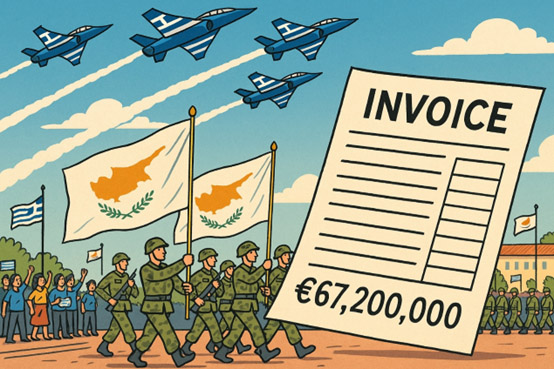By Flora Alexandrou
Cyprus has just marked 65 years of independence, a milestone that should inspire pride and reflection. Instead, it arrived with a bitter aftertaste.
While foreign capitals sent warm congratulations, Brussels anticipated a bill of €67.2 million to be repaid over the Vassilikos energy terminal fiasco, yet another national project sunk under suspicions of corruption.
At the heart of the issue is the long-delayed facility meant to secure the island’s energy independence but mired in cost overruns, disputes and mismanagement. Funded with €101 million through the ‘CyprusGas2EU’ scheme, it has led the European Commission to seek repayment after prosecutors launched an investigation into suspected fraud and misuse of funds.
This inevitably prompts the question: can a country that keeps stumbling over its own corruption scandals truly claim to stand independent?
Corruption is a complex and evolving concept with no universally agreed definition. Neither laws nor international conventions offer a clear interpretation, and the Cypriot criminal code treats it simply as a set of offences. Dictionaries, by contrast, define it plainly as “dishonest or illegal behaviour by powerful people, usually government officials, or inducement to wrongdoing through improper means such as bribery”. That seems straightforward enough.
But is it straightforward to Cyprus’ leadership? In 2022, during a televised presidential debate, Nikos Christodoulides was asked what he considered corruption. His answer: “Corruption is anything that falls outside the framework of legality.” His example? Parents trying to enroll their child in a school outside their designated district. If that is the gold standard of corruption, then the sharks circling public contracts and offshore accounts can swim freely while the state busies itself chasing mothers sneaking their children into a better school. How can a country fight corruption if it cannot even define it?
The deeper reality is that corruption steadily erodes independence. Institutions hollow out when procurement is rigged, contracts bent, and oversight sleeps. Independence is not about waving a (Greek!) flag from a balcony but about the ability to govern. A state that cannot manage its own energy projects without outside auditors looks less self-reliant and more like a ward under guardianship.
The corrosion does not stop at governance. When corruption spreads its tentacles into a country’s justice system and democracy is distorted, independence becomes an illusion.
Every corruption scandal chips away at public trust, and when trust collapses, cohesion collapses with it. A people that doubts its own leaders cannot speak abroad with one voice. Instead of independence, it produces a brittle patchwork, easy to divide and easy to sway.
The cost is not only political but economic. Every euro siphoned from hospitals, schools and infrastructure leaves the state weaker and more dependent, whether on EU funds, foreign investors, or geopolitical patrons. Fragility makes sovereignty negotiable. Independence shrinks when the national budget is hostage to scandal.
True independence is not a parade with borrowed jets or a borrowed anthem. It is lived daily through integrity, accountability, and civic trust. When corruption severs citizens from their state, national purpose withers. And when morale fades, so too does the will to defend sovereignty.
Cyprus faces an even harsher truth: it does not fully control its own land. Turkish occupation, foreign troops and external meddling weigh heavily on its sovereignty.
So, is Cyprus independent? Formally, yes. Yet each time corruption triumphs over accountability, independence is hollowed out. Until a reckoning comes, Cyprus will keep staging parades for its freedom while wasting years debating whether a school grade of 17.2 was really 13.9, as in the infamous Yiannakis case that dragged on for more than four years before the obvious became official.






Click here to change your cookie preferences